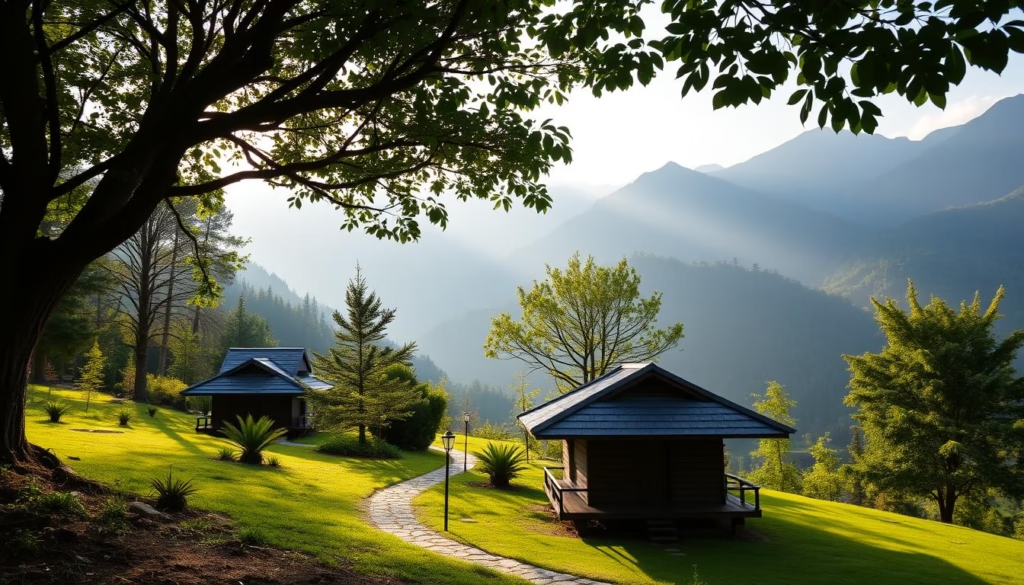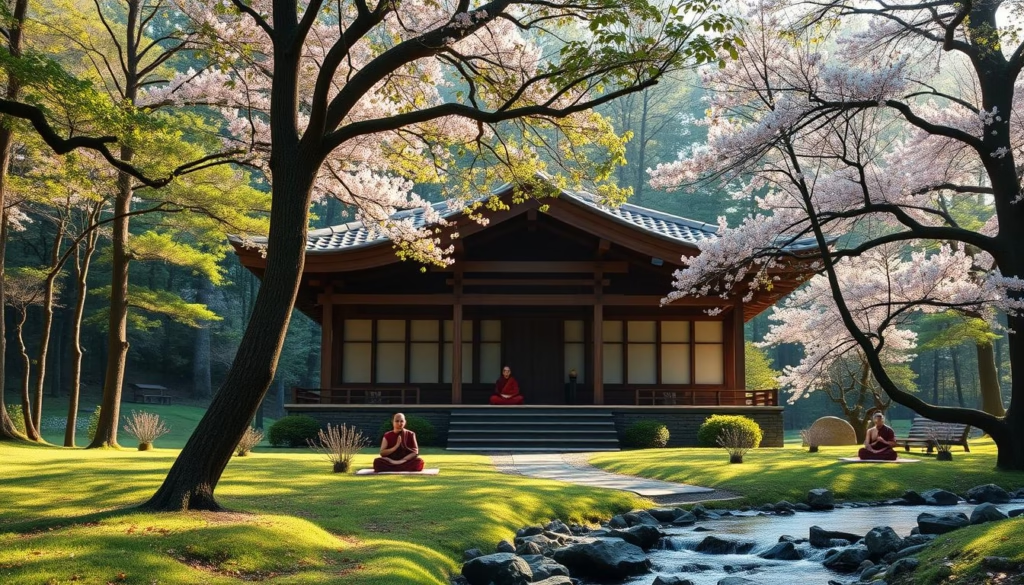Meditation Retreats: Discover the Best Places for Inner Peace
November 30, 2024 | by m33559844@gmail.com

introduction: Meditation Retreats
In today’s fast-paced world, it’s easy to lose touch with ourselves. The constant noise of daily life can overwhelm us, making us feel disconnected. Many seek a quiet place to pause, breathe, and find themselves again.
Meditation retreats offer such a space. They are sanctuaries where peace reigns and chaos fades away. These retreats are designed for spiritual growth and inner reflection. They can be found in beautiful locations, from mountains to oceans, offering a chance to reconnect with oneself.
At these retreats, participants learn meditation and experience health benefits. They report less stress, better sleep, and a stronger immune system. With many styles and locations available, finding the right retreat is easy.
Key Takeaways
- Meditation retreats provide a tranquil environment conducive to spiritual growth.
- Attendees can experience stress reduction and health benefits, including improved sleep and boosted immunity1.
- Retreats vary in location and practice style, appealing to both newcomers and seasoned meditators.
- Every participant can expect to engage in transformative mindfulness and holistic wellness practices.
- Finding a meditation retreat near me can lead to lasting change and personal discovery.
If you’re ready to kickstart your travel journey with ease and exclusive savings, book your first trip now! Visit Trip.com using this special promotion link and register to reserve tickets, accommodation, and more. Don’t miss out on these incredible travel deals tailored for first-time travelers—start planning today!
Understanding the Importance of Meditation Retreats
Meditation retreats are known for their benefits on mental health and personal growth. They help reduce stress, improve focus, and increase inner peace. Studies show that stress can raise cortisol levels up to nine times more than relaxed states2. Just 20 minutes of meditation twice a day can lower stress levels, showing meditation’s value3.
Going to a meditation retreat means leaving daily distractions behind. It’s a chance to connect deeply with oneself and explore consciousness. Research shows that these retreats can change brain patterns, making us more alert and focused2. Meditation also releases chemicals that calm the mind3.
A three-day retreat can quiet the mind and refresh the spirit3. Retreats offer various settings, from private cabins to shared dorms, to fit different needs and budgets4. This variety helps tailor the experience to each person’s goals and interests. It’s important to have a clear goal and an open mind to fully benefit from these retreats.
What to Expect at a Meditation Retreat
Going to a meditation retreat is a special meditation experience. It’s filled with activities designed to help you think deeply and be more mindful. These retreats usually last from 7 to 10 days. They include things like guided meditation, yoga, and quiet time to help you grow personally.
A 5-day silent retreat, for example, focuses on walking meditation and time alone. This lets you dive deep into thinking about yourself5.
You’ll stay in peaceful places that help you relax and feel supported. Each day, you’ll have healthy meals, talks about mindfulness, and special programs. For example, the Kausay Community retreat in Valencia, Spain, has a day full of silent meditation, yoga, and mindfulness sessions5.
The retreat’s setting helps you find inner peace. But it also brings challenges. You can’t use your phone and must stay quiet. This helps you notice your thoughts better6.
People go to these retreats for many reasons. Some want to stop using their phones too much. Others seek clarity in their relationships or just want to try meditation therapy5
In short, you’re in for a deep experience that challenges and changes you. By facing your thoughts and feelings without judgment, you can learn to be kinder to yourself. This can change how you live your life for good6.
Types of Meditation Retreats Available
Meditation retreats come in many forms to meet various needs and tastes. You can find silent retreats, vipassana retreats, and mindfulness retreats.
Silent retreats are all about quiet reflection. They help you explore your thoughts deeply without distractions. These retreats can last from two days to a week. On the other hand, vipassana retreats focus on deep awareness, following Buddhist traditions. They often last ten days or more, with intense meditation schedules.
Mindfulness retreats teach you to live in the moment. They might include yoga or walks in nature. Some retreats focus on emotional healing or mental health. Prices vary, but a basic five-day retreat can cost $100. Premium options can reach up to $8,0007
| Type of Retreat | Focus | Typical Duration | Price Range |
|---|---|---|---|
| Silent Retreats | Quiet reflection and solitude | 2 days to 1 week | $100 to $2,555 |
| Vipassana Retreats | Intensive awareness practice | 10 days or longer | $140 to $22,400 |
| Mindfulness Retreats | Present moment awareness | 3 to 5 days | $162 to $3,449 |
| Spiritual Retreats | Specific themes (e.g., emotional cleansing) | Varies | $540 to $8,000 |
There are 2,825 meditation retreats listed, with prices changing based on location, season, and quality. Popular spots include Ubud, Bali, and Yosemite National Park8.
Benefits of Attending a Silent Retreat
Silent retreats are a powerful way to find mindfulness and inner peace. People take a vow of silence and do activities like meditation and yoga. This helps them understand themselves better and think deeply about their lives9.
By avoiding distractions like phones and social media, people can really explore their inner world. This makes it a great place for personal growth10.
Studies show that silent meditation helps with emotional control. It makes people more compassionate and empathetic in their relationships10. Going to a silent retreat can also lower stress and improve life quality, boosting the immune system9.
Being in nature during the retreat brings joy and adds to the peaceful experience. It’s a time for reflection and finding calm.
Doing things in silence during the retreat requires patience but is very rewarding. It shows that the effort is worth it9. Research also finds that silent retreats improve brain function, making it more efficient9.
In summary, silent retreats offer deep benefits. They help people find clarity and connect with themselves on a deeper level.
Meditation Retreats: Choosing the Right Location
Finding the right meditation retreat is about what you like, what you want to do, and being in nature. Think about the scenery you prefer, like the ocean or jungle. Also, consider the type of place you’ll stay, from fancy suites to places that feel more like nature. Retreats last from 3 to 14 nights, so you can pick one that fits your schedule11.
Meditation Retreats: Choosing the Right Location
Finding the right meditation retreat is about what you like, what you want to do, and being in nature. Think about the scenery you prefer, like the ocean or jungle. Also, consider the type of place you’ll stay, from fancy suites to places that feel more like nature. Retreats last from 3 to 14 nights, so you can pick one that fits your schedule11.
Factors to Consider When Selecting a Retreat
Before you decide, think about these things:
- Desired Scenery: Places like mountains, beaches, or forests help with meditation.
- Preferred Activities: Look for retreats with yoga or hiking classes.
- Accommodation: Pick private rooms for alone time or shared spaces for community.
- Dietary Needs: Most retreats offer vegetarian or vegan food. Make sure they can meet your special diet needs12.
Popular Destinations for Meditation Retreats
There are many great places around the world for meditation retreats:
- Bali, Indonesia: It’s known for wellness and culture.
- Costa Rica: It has beautiful landscapes and lots of nature activities for relaxation.
- Rishikesh, India: It’s famous for yoga and peaceful riverside retreats.
- Marbella, Spain: The Shanti-Som Wellbeing Retreat is there. It has a pool and is close to Malaga airport. It’s small, with only 15 rooms, and focuses on healthy eating11.
Exploring Vipassana Meditation Retreats
Vipassana meditation retreats dive deep into the mind-body connection. They help people become more aware through focused practice. These retreats last ten days, where everyone stays silent and observes themselves closely.
This silence helps people understand their thoughts better. It teaches them to stay calm and find peace within. This leads to clearer thinking and a more balanced life.

If you’re ready to kickstart your travel journey with ease and exclusive savings, book your first trip now! Visit Trip.com using this special promotion link and register to reserve tickets, accommodation, and more. Don’t miss out on these incredible travel deals tailored for first-time travelers—start planning today!
There are now 172 top vipassana meditation retreats worldwide. They have gotten 6,192 reviews, showing more people want to try these experiences13. Prices range from US$180 to US$3,999, making them open to many13.
Many share their amazing stories from these retreats. On the fifth day, the silence can be tough. But, it leads to a big emotional release as people get used to deep thinking14.
By the sixth day, some feel very tired. This is because they face their emotions deeply14.
But, as people keep going, they notice their senses getting sharper. This is backed by studies on the brain’s ability to change14. These changes make a big difference in their everyday lives.
As they reach the end, they celebrate big wins. Like doing a full hour of meditation without moving on the eighth day14. These moments show the real benefits of vipassana and the power of sticking with it.
Mindfulness Retreats: Finding Balance and Peace
In today’s fast world, many look for a mindfulness retreat as a place to relax and think deeply. Studies show that meditation retreats can lower stress and anxiety, making us feel better emotionally15. These retreats mix meditation, yoga, and guided talks to help us stay in the moment.
At a mindfulness retreat, you’ll follow a set schedule. This includes meditation, yoga, workshops, and time for quiet thought. This mix is great for growing personally and finding lasting peace15.
The place of a mindfulness retreat matters a lot. Desert retreats are calm, mountains offer quiet, and beaches are soothing for reflection15.
Being in nature helps you disconnect from tech. This lets you focus on now, leading to deeper peace and balance.
Retreats come in different lengths and styles. Places like Spirit Rock Meditation Center have many options, from short groups to family programs. Others, like Esalen Institute, offer programs on 100 acres to improve life skills16. Retreats at Insight Meditation Society cater to both new and seasoned meditators, offering experiences tailored to each16.
Going to a mindfulness retreat can refresh your mind and stabilize your emotions. You’ll leave with tools to bring mindfulness into your everyday life. This helps you handle life’s challenges with more calm and confidence.
Unique Experiences at a Buddhist Retreat
Buddhist retreats offer unique meditation experiences that explore Eastern philosophies. You can join in community rituals and listen to dharma talks by experienced monks. These events are perfect for personal and spiritual growth.
Retreats provide three vegetarian meals a day and a schedule full of meditation and teachings. You’ll stay in the monastery, creating a close community. Costs vary, from US$180 to US$5,800, to fit different budgets17.
The length of a retreat can be from 2 days to 30 days. This lets you pick a time that fits your needs17. Many retreats also help the local community and support jobs, promoting sustainability18.
Retreats help with mental clarity, inner peace, and emotional healing. They welcome women, couples, solo travelers, and groups. You can explore yoga, sound healing, and more, for spiritual growth17.
| Aspect | Description |
|---|---|
| Duration | Options from 2 to 30 days available |
| Cost | Ranges from US$180 to $5,800 |
| Meals | Three vegetarian meals served daily |
| Accommodations | Provided at the monastery |
| Participants | Minimum of five required for retreat to proceed |
| Community Contribution | Part of fees support local employment and sustainability |

Planning Your Visit: What to Pack for a Retreat
Getting ready for a meditation retreat means thinking about what to bring. The right items can make your stay better. You’ll want clothes that are comfy for both relaxing and meditating.
Essential Items for a Comfortable Stay
Here are some must-haves for your retreat:
- Wear clothes that are comfy for meditation and activities. 78% of attendees bring a meditation shawl for extra comfort19.
- Bring a refillable water bottle to cut down on plastic waste. 87% of travelers do this19. Don’t forget sunscreen for outdoor activities, as 42% of attendees prioritize it19.
- Carry a journal for reflection, as 56% of retreat participants find it essential19. It’s also smart to bring your own snacks, especially if you have special dietary needs. 68% of travelers with specific needs do this19.
Don’t forget to plan for your medications. 83% of retreat participants prepare for these19. Also, bring copies of your passport and a hidden stash of money for safety.
Lastly, pack comfy walking shoes for hiking. 94% of retreat participants prefer them19. An extra pair of socks is also a good idea, especially at wellness resorts20. The aim is to be both comfortable and mindful during your retreat.
Staying Connected: Techniques to Enhance Your Retreat Experience
At a meditation retreat, staying connected is key. It makes the experience better. More people want to get away from daily life and find themselves again21. Writing in a journal helps you think about your feelings and what you’ve learned.
Trying different meditation ways helps you understand mindfulness better. You can learn Body Scan and Mindful Walking. These practices help you stay in the moment and feel calm22. Talking with others makes you feel part of a community, which is important for feeling good during the retreat.

If you’re ready to kickstart your travel journey with ease and exclusive savings, book your first trip now! Visit Trip.com using this special promotion link and register to reserve tickets, accommodation, and more. Don’t miss out on these incredible travel deals tailored for first-time travelers—start planning today!
Making mindfulness a part of your day makes the retreat even better21. Good food and care for guests add to the positive vibe. Getting feedback after the retreat helps make future experiences even better.
Conclusion
Meditation retreats are a deep dive into personal growth, healing, and relaxation. They help with both mental and physical health. These retreats are more than a break; they lead to lasting changes in anxiety, depression, and stress.
Research shows that people see big improvements in their lives and feelings. They feel better and more emotionally balanced2324.
The group aspect of these retreats adds to the experience. It creates a sense of shared purpose and connection. Studies show that mindfulness here boosts well-being and reduces fatigue, lasting long after the retreat25.
Spa Retreats: Discover the Best Destinations for Ultimate . In short, meditation retreats offer a wide range of benefits, no matter where they are. They help find inner peace, making them a great choice for dealing with today’s challenges.
FAQ
What is a meditation retreat?
A meditation retreat is a special time and place for people to step away from their daily lives. It’s a chance to focus on spiritual growth and inner peace. Activities like guided meditations, yoga, and mindfulness workshops are common.
Are there different types of meditation retreats?
Yes, there are many types of meditation retreats. You can find silent retreats, vipassana retreats, mindfulness retreats, and Buddhist retreats. Each type has its own practices to help you relax, discover yourself, or grow spiritually.
What should I expect at a silent meditation retreat?
At a silent retreat, you’ll spend time in quiet reflection and meditation. The schedule includes guided meditation, yoga, and time for personal introspection. It’s a space for deep mindfulness and clarity.
How can a meditation retreat benefit my mental health?
Meditation retreats can greatly improve your mental health. They help reduce stress, improve focus, and make you emotionally stable. The retreat’s immersive environment helps you reconnect with yourself and explore your consciousness.
What locations are popular for meditation retreats?
Popular places for meditation retreats include Bali, Costa Rica, and the mountains of India. Each location offers a unique setting that adds to the retreat experience. They cater to different wellness needs.
What is involved in vipassana meditation retreats?
Vipassana retreats usually last ten days. They involve deep practices to understand the mind-body connection. You’ll do silent meditation to observe your thoughts and gain insight.
How do I select the right meditation retreat for me?
When picking a meditation retreat, think about the scenery, activities (like hiking or yoga), and accommodation. Consider your wellness needs and personal preferences to make a good choice.
What should I pack for a meditation retreat?
For a meditation retreat, pack comfortable clothes for meditation and yoga. Don’t forget personal toiletries, a refillable water bottle, and a journal. Bringing a cushion or blanket can also make your experience better.
How can I enhance my experience during a meditation retreat?
To make the most of your retreat, fully engage in meditation and journal your thoughts. Connect with others at the retreat. Being mindful in every moment helps build community and enriches your experience.
RELATED POSTS
View all



